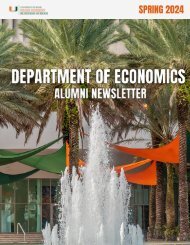ECONOMICS ALUMNI NEWSLETTER
You also want an ePaper? Increase the reach of your titles
YUMPU automatically turns print PDFs into web optimized ePapers that Google loves.
Konrad Grabiszewski and I are pioneering a what we<br />
think is groundbreaking approach to experimental<br />
research called mobile experiments. Our idea is<br />
motivated by the fact that there are over 5 billion<br />
mobile phone users worldwide and that smartphones<br />
have become essential for many daily activities.<br />
From this, we saw a potential for mobile devices to<br />
serve as experimental labs. And so, we decided to<br />
develop a new way for researchers to study human<br />
behavior on an unprecedented global scale by<br />
collecting data from users asked to play strategic<br />
games in laboratory settings via their smartphones.<br />
The widescale use of mobile devices offers several<br />
advantages for experimental research. One important<br />
advantage is that mobile experiments can potentially<br />
reach billions of people, mitigating the problem of<br />
small sample size. At the same time, it eliminates<br />
the need for travel and face-to-face interactions.<br />
Not only does this save on expense, but it promotes<br />
sustainable research practices.<br />
Our first mobile experiment, called Blues and Reds<br />
(www.bluesandreds.com), has been downloaded in<br />
over 140 countries, with players completing over<br />
75,000 games.<br />
The data from this experiment has been used in<br />
four research projects focused on understanding<br />
decision-making. In one project, we discovered<br />
that people often fail to find the correct solution<br />
to a problem not because they do not know how<br />
to solve it, but because they don't understand the<br />
problem itself.<br />
This finding has practical implications. For<br />
example, it suggests that policymakers should<br />
focus on improving communication and education<br />
to ensure the public fully understands the<br />
problems being addressed by policies being<br />
proposed by legislators. This suggests that more<br />
effort should be devoted to simplifying complex<br />
issues, using relatable examples, and employing<br />
various communication channels to reach diverse<br />
audiences. Businesses should also prioritize clear<br />
communication within their organizations, so<br />
employees understand the goals, objectives, and<br />
challenges they face. As Einstein famously said,<br />
“If I had an hour to solve a problem, I'd spend 55<br />
minutes thinking about the problem and 5 minutes<br />
thinking about solutions.” Our findings from Blues<br />
and Reds supports this idea.<br />
Currently, we are working on three more mobile<br />
experiments. One is complete and is called<br />
Strategize It! (www.strategizeit.org), another is<br />
about to be launched and is called Escapismo<br />
(www.escapismo.org), and the third one is a<br />
financial trading laboratory that is in production.<br />
Mobile experiments have the potential to<br />
revolutionize research and our understanding of<br />
human behavior in various fields, such as<br />
psychology, economics, healthcare, and<br />
education. As scientists, we're excited to embrace<br />
and shape this new chapter of experimental<br />
research by leveraging the widespread use of<br />
smartphones and the power of mobile apps.




